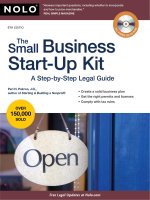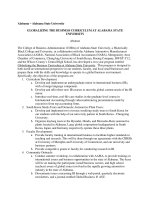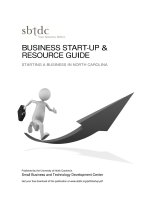kaplan - the business start up kit
Bạn đang xem bản rút gọn của tài liệu. Xem và tải ngay bản đầy đủ của tài liệu tại đây (1.71 MB, 287 trang )
GetPedia
The Business Start-Up
Kit
Steven D. Strauss
DEARBORN™
TRADE PUBLISHING
TEAMFLY
Team-Fly
®
gard to the subject matter covered. It is sold with the understanding that the pub-
lisher is not engaged in rendering legal, accounting, or other professional service. If
legal advice or other expert assistance is required, the services of a competent pro-
fessional should be sought.
Vice President and Publisher: Cynthia A. Zigmund
Editorial Director: Donald J. Hull
Senior Acquisitions Editor: Jean Iversen
Senior Project Editor: Trey Thoelcke
Interior Design: Lucy Jenkins
Cover Design: KTK Design Associates
Typesetting: the dotted i
© 2003 by Steven D. Strauss
Published by Dearborn Trade Publishing, a Kaplan Professional Company
All rights reserved. The text of this publication, or any part thereof, may not be re-
produced in any manner whatsoever without written permission from the publisher.
Printed in the United States of America
03 04 05 10 987654321
Library of Congress Cataloging-in-Publication Data
Strauss, Steven D., 1958–
The business start-up kit / Steven D. Strauss.
p. cm.
Includes index.
ISBN 0-7931-6027-8
1. New business enterprises—Management. 2. New business enterprises—
United States—Management. 3. Entrepreneurship. 4. Success in business.
I. Title.
HD62.5 .S79 2003
658.1′1—dc21
2002014170
Dearborn Trade books are available at special quantity discounts to use for sales pro-
motions, employee premiums, or educational purposes. Please call our special sales
department, to order or for more information, at 800-621-9621, ext. 4410, or write
to Dearborn Financial Publishing, 30 South Wacker Drive, Suite 2500, Chicago, IL
60606-7481.
Dedication
For M, with love
This Page Intentionally Left Blank
Contents
Preface ix
PART I. Business Overview: A broad overview of business in general and
some ideas about what type of business might be best for you.
1. Business Overview 3
The pros and cons of starting a business
Understanding if you are an entrepreneur
Picking the best business
2. The Home-Based Business Advantage 19
The home-based business revolution
Risks and rewards
Setting up shop at home
3. Buying Franchises and Other Businesses 31
Would you make a good franchisee?
Finding the right franchise
Analyzing the franchisor and the opportunity
How to intelligently buy an existing business
4. Preparation, Production, and Distribution 51
Preparing your product for market
Test marketing your product or service
Producing a winning product
v
PART II. Getting Started: Begin to put the first pieces of the successful
business puzzle together.
5. Planning Your Business 63
Analyzing your idea
Understanding your potential market
Creating a winning business plan
6. Choosing Great Names and Locations 79
Picking a great name
Location, location, location
7. Licenses, Permits, and Business Formation 93
Understanding which form of business is best
Sole proprietorships and partnerships
Incorporation pros and cons
Licenses and permit requirement
8. Outfitting the Office 103
Automating your office
Choosing the right hardware and software
Phone, fax, and mail solutions
9. Show Me the Money 111
Figuring out how much money you need
Business loans made easy
Successfully attracting angels and venture capital
Even more strategies for finding the money
PART III. Opening Up Shop: Everything you need to know to get started—
in plain English.
10. Creating a Great Image 125
The elements of your winning image
Brochures and signs
Business Web sites made easy
11. Let the Numbers Do the Talking 135
Making a profit is the name of the game
Picking the right price point should not be difficult
Taking the risk out of accepting checks and credit cards
vi Contents
12. Law, Taxes, and Insurance 145
How to find a good lawyer or accountant
How to hire great employees
Law and taxes made easy
PART IV. Business on a Shoestring: How to start and run a business without
spending a lot of money.
13. Bootstrap Financing 161
The bootstrap rules
Tapping other people’s money
Five more options for financing the dream
14. Setting Up Shop at Bargain Prices 173
Preserving your precious capital
Getting fixtures and equipment for almost nothing
Stocking the shelves for next to nothing
15. Growing Your Business without Big Bucks 183
Inexpensive advertising and marketing secrets
Web sites for less
Motivating without money
PART V. Growing Your Business: Proven advertising and marketing
strategies.
16. Successful Advertising Strategies 197
The importance of advertising
Understanding the options available
Creating a winning ad
17. Successful Marketing Strategies 207
Your successful marketing plan
Marketing tools you can use
How to easily generate publicity for your business
18. Caring for Customers and Employees 219
Customer service made easy
Training your employees the right way
Create a compelling mission
Contents vii
PART VI. Success Strategies: Secrets of Success.
19. Business Jujitsu 235
Understanding business jujitsu
Turning problems into opportunities
Mistakes you can avoid
Getting great advice
20. Business Success Secrets 247
Create a winning business recipe
Create multiple profit centers
Seven secrets of the great entrepreneurs
References 259
Index 265
About the Author 00
viii Contents
Preface
Your own successful business can be many things. It can be your meal
ticket, ensuring the economic health of you and your family. It can be your
source of creativity, giving you an outlet for all of those ideas you have. It can
be your security, the comfort that comes from knowing that there is no boss
who can fire you. It can even be your pride and joy, an accomplishment that
you point to with satisfaction, knowing that you alone created it out of whole
cloth.
But more than anything else, I think that owning your own business and
being an entrepreneur is about freedom. Yes, the money that comes from a
successful business is great. And yes, being energized and enthused about
your day is special. Being free is priceless. If you do it right, you are free to
start whatever sort of business you want. You are free to start it where you
want, and free to work the hours you choose. You are free to make as much
money as you are capable of, without yearly limits or performance reviews.
But you will notice that all this only comes about if you do it right. When
you choose to become an entrepreneur, there are no guarantees. In large
part, whether you succeed or fail is up to you. So, how do you do it right?
Read this book. It is dedicated to helping you succeed. And unlike other start-
your-own-business books on the market, what sets this book apart is that it
offers a model of business success, a simple model that is easily duplicated.
It might help to think of your business as having two parts. The first part
is found in Chapters 1, 2, and 3 of this book—choosing and doing something
ix
that you love to do. That is the “technical” aspect of the business. The den-
tist fills the cavities, the photographer takes the pictures. Practically every
business is set up to allow the owner to make money doing some sort of
technical work that he or she loves.
The second part of your business is everything else—the actual running
of the business itself. That is found in the rest of this book, Chapters 4
through 20. The dentist must network and bring in new clients, and the pho-
tographer must get referrals, bill customers, and generate leads. There are
myriad things that go into running the actual business, aside from doing the
“thing” that you love to do. When I talk about a model of business success, it
is all of these other things to which I am referring.
The vast majority of this book is dedicated to teaching you this second
part of business. If the dentist and photographer follow the model laid out in
this book, they will be free to spend more time doing what it is they love,
rather than worrying about the business. Do it right and the business will
take care of itself, and you, in turn, will be free. You can plug almost any
“technical” job into this business model and it would work.
The model is neither complicated nor complex. It is simple, easy, and
fun. Learn it and free yourself up to grow, make more money, and do what it
is you love. When you learn how to run your business properly, you get to a
point where the world will be paying you to do what you love most. And that,
as Alan Ginsberg once observed, is the real trick of life.
Acknowledgments
I would like to thank Jean Iversen for her patience and understanding. I
would also like to thank Maria, Jillian, Sydney, and Mara.
x Preface
TEAMFLY
Team-Fly
®
PART
I
Business Overview
This section gives you a broad overview of business in
general and explores some ideas about what sort of business
might be best for you. It’s all here—home-based businesses,
franchises, starting your own business from scratch, buying
an existing business.
This Page Intentionally Left Blank
CHAPTER
1
Business Overview
Congratulations! The decision to start your own business can be one of the
best you will ever make in your life. Owning your own business should be an ex-
hilarating, inspiring, grand adventure; one full of new sights and experiences,
delicious highs and occasional lows, tricky paths and, hopefully, big open skys.
But to ensure that your business journey will be a fruitful one, it is im-
portant to understand all that becoming an entrepreneur entails. Therefore,
in Part I, especially in this chapter, you will get a broad overview of business
and its many forms and possibilities.
Pros and Cons
Many people start their business adventure dreaming of riches and free-
dom. And while both are certainly possible, the first thing to understand is
that there are tradeoffs when you decide to start a business. Difficult bosses,
annoying coworkers, peculiar policies, demands upon your time, and limits
on how much money you can make are traded for independence, creativity,
opportunity, and power. But by the same token, you also swap a regular pay-
check and benefits for no paycheck and no benefits. A life of security, com-
fort, and regularity is traded for one of uncertainty.
There are definitely pros and cons to starting your own business. To be
more precise, the benefits of starting a business include:
3
• Control. Even if you like your boss and your job, the possibility re-
mains that you can be laid off at any time. That boss you like so much
can be transferred. Your company can go bankrupt. So one advantage
of starting your own business is that you are more in control of your
work and career. And while that may be comforting, you should also
realize that with that control will come increased responsibility and a
new set of demands. As the boss, the buck must stop with you. You
are the one who has to meet payroll. You are the one who has to make
sure that clients and customers are happy. You are the one who must
hire and fire the employees. It is not always easy, and you can bet that
there will certainly be times when you will look fondly back on your
days as an employee, when you had far less responsibility and control.
• Money. Many people choose to start their own business for the sim-
ple reason that they think that they are worth more money than they
are making or they want the chance to provide a better life for their
family. There is usually a limit to how much money you can make
when you are an employee. The good news is that when you are the
employer, the entrepreneur, the boss, there are far fewer limits. That
can be a good or bad thing; you may make a fortune, or you may go
bust. If this kind of uncertainty appeals to you, good, because it is
what you will be getting if you start your own business.
• Creativity and independence. If you feel stagnant in your current job,
you won’t feel stagnant for long if you start a business. Running your
own business may require you to be the marketing wizard, salesman,
bookkeeper, secretary, and president all rolled into one. It is a hectic
life. But you may not mind that. It’s kind of like the Calvin and Hobbes
cartoon in which Calvin’s mother tells him to make his bed. Calvin de-
cides to build a robot to make the bed for him. When Hobbes asks,
“Isn’t making the robot more work than making the bed?” Calvin an-
swers, “It’s only work if someone makes you do it!” The same holds
true when the business is yours—it often doesn’t feel like work be-
cause no one is making you do it.
• Freedom. Working at your own business gives you the flexibility to
decide when and where you will work. You decide your hours and
place of business. The freedom that comes with being your own boss,
where no one can tell you what to do or how to do it, may be the best
thing about being an entrepreneur.
4 THE BUSINESS START-UP KIT
But there are also downsides to starting your own business:
• Uncertainty. As indicated, the life of an entrepreneur is not necessarily
an easy one. Is it fun? Yes. Is it challenging, exciting, and spontaneous?
You bet. But it is not easy. The hardest part of being in business for
yourself is that there is no steady source of income; a paycheck does
not come every two weeks.
• Risk. What is an entrepreneur? An entrepreneur is someone who is
willing to take a risk with money to make money.Not all entrepre-
neurial ventures are successful. The willingness to take a smart, calcu-
lated risk is the hallmark of a smart entrepreneur. But even calculated
risks are still risks. You could make a million or you could go bankrupt.
• Lack of structure. Many people like the structure of working for
someone else. They know what is expected of them and what they
need to accomplish each day. This is not true when you work for
yourself. The work is very unpredictable.
You need to consider carefully both the risks and rewards of entrepre-
neurship before deciding to jump in. It is easy to become infatuated with the
idea of owning your own business. But if you are going to do it right, if you
are going to be successful, you need to take emotion out of the equation. You
have to begin to think like a businessman, consider the risks, and make an in-
formed, intelligent, calculated decision.
Do You Have What It Takes?
Considering the pros and cons of this venture is not enough. Making the
decision to leave your job and start a business is monumental. Even if starting
a business seems like a great idea, despite the drawbacks, the question re-
mains: How do you know if you are cut out to be an entrepreneur? Do you
have what it takes? In order to assist you, answer the questions in the fol-
lowing quiz. It will help you evaluate your qualifications.
As you answer the questions, be sure to be perfectly honest. There is no
need to get every question “right.” Businesspeople come in all shapes, sizes,
temperaments, and skill levels. Thus, no test can determine if you are per-
fectly suited to be an entrepreneur. But this test will help you realize some of
the skills necessary to start your own business. You will only be hurting your-
self and your business if you pretend to have skills you don’t possess.
1 / Business Overview 5
6 THE BUSINESS START-UP KIT
✎ Assessing Yourself
1. Are you a self-starter?
a) Yes, I like to do things on my own.
b) If someone helps me get started, I will definitely follow through.
c) Most of the time, I would rather follow than lead.
2. How do you feel about taking risks?
a) I really like the feeling of being a bit on the edge.
b) Calculated risks are acceptable at times.
c) I like the tried and true.
3. Are you a leader?
a) I usually get people to go along when I initiate something.
b) I can give the orders if I have to.
c) I let someone else get things moving, then I take part if I feel like it.
4. Do you like to assume responsibility?
a) Yes, I enjoy taking charge of things and seeing them through.
b) I’ll take over if I have to, but would rather let someone else be
responsible.
c) There’s always some eager beaver around wanting to show how
smart he is. I say let him.
5. How organized are you?
a) I like to have a plan before I start.
b) Being well organized isn’t my strongest suit, but I can do it when
necessary.
c) I just like to take things as they come.
6. How hard are you willing to work?
a) I can stay motivated as long as necessary.
b) I’ll work hard for a while, but when I’ve had enough, that’s it.
c) I think many other things are more important than work.
7. Are you decisive?
a) I can make up my mind in a hurry if I have to.
b) If I have to make up my mind quickly, I do, but I don’t like it.
c) I don’t like to be the one to decide things.
1 / Business Overview 7
8. Can you live with uncertainty?
a) Yes.
b) I can if I have to, but I don’t like it.
c) No, I like knowing what to expect.
9. Can you stick with it?
a) If I make up my mind to do something, I don’t let anything get in
the way.
b) Usually.
c) If things don’t go right, I may just quit.
10. How good is your health?
a) I never run down!
b) I have enough energy for most of the things I want to do.
c) I run out of energy sooner than most of my friends.
11. Are you competitive?
a) You bet.
b) When I need to be, I can be.
c) Not really, my nature is more laid-back.
12. Do you have a lot of willpower and self-discipline?
a) Yes.
b) I am disciplined when I need to be.
c) Not really.
13. Do you plan ahead?
a) In my book, failure to plan is planning to fail.
b) Planning is important, but so is spontaneity.
c) I take one day at a time and let life take me where it will.
14. Are you creative?
a) Yes I am. I am always thinking up new ideas.
b) I have an occasional brainstorm.
c) No, not really.
15. Can you live without structure?
a) Yes.
b) Actually, the idea of living without a regular job or paycheck makes
me nervous.
c) No, I like routine and structure in my life.
If you answered “a” on more than half of the questions, you have the
personality needed to run your own business. If most of your answers were
“b,” you’re likely to encounter more trouble than you may want.
If you have several “c” answers, then you are not quite ready to start
your own business. But that does not mean that you can’t get ready. While
certain aspects of entrepreneurship are innate (the willingness to take a risk,
for example), many are learned (such as knowing how to conduct market re-
search). If the results of this quiz tell you to slow down, that is good. You can
always take business classes, read more books, or listen to business tapes in
order to learn more. Another option would be to get a partner who has the
skills you lack. There are many ways to start your own business, and if you
are not ready now, it does not mean you will never be ready.
Getting Started
Once you have decided that starting a business is right for you despite
the risks, the question becomes: What’s next? People often love the idea of
8 THE BUSINESS START-UP KIT
■ Real Life Example
During World War II, a rubber shortage in the United States necessitated
that the U.S. War Productions Board request that American companies try
to create a synthetic rubber. In one of its experiments in support of this re-
quest, General Electric ended up with a pliable goo that, while not rubber,
was interesting. Not knowing what to do with the stuff, GE sent it to aca-
demics all over the world, looking for suggestions. No one could think of a
scientific use for the goo.
A few years after the war, a Harvard professor who had received some
of the stuff earlier brought it out as a conversation piece at a cocktail party
he was having. A guest at the party,a broke entrepreneur named Peter
Hodgson, saw the adults playing with the stuff and had an idea. Despite
being deeply in debt, Hodgson borrowed $150 and bought 21 pounds of
the stuff along with the patent rights from GE. He started his own business
in which he sold the goo packaged in small amounts in little plastic eggs.
He named it Silly Putty.
starting a business but get bogged down in the actual nitty gritty of just how
to do it. It might help to know that no matter what type of business you de-
cide to start, the essential steps are the same. Different businesses will have
slightly different paths but, generally speaking, most businesses follow a for-
mulaic path. While this formula will be discussed in much more detail through-
out this book, it will be helpful to have a road map to show you where you
are headed.
Step 1: Personal Evaluation
You need to begin by taking stock of yourself and your situation in order
to figure out which sort of business is best for you. Why do you want to start
a business? Is it money, freedom, creativity, or some other reason? What do
you bring to the table? What skills do you have? What industries do you know
best? Would you want to provide a service or a product? What do you like to
do? How much capital do you have to risk? Will it be a full-time or a part-time
venture? Will you have employees? The answers to these types of questions
will help you narrow your focus and pick a business. The rest of this chapter
will help you do that.
Step 2: Analyze the Industry
Once you decide on a business that fits your goals and lifestyle, you will
need to evaluate your idea. Who will buy your product or service? Who will
be your competitors?
Step 3: Draft a Business Plan
If you will be seeking outside financing, a business plan is a necessity.
But even if you are going to finance the venture yourself, a business plan will
help you figure out how much money you will need to get started, what tasks
need to be done when, and where you are headed.
Step 4: Make It Legal
There are several ways to form your business. It could be a sole propri-
etorship, a partnership, or a corporation. Although incorporating can be ex-
pensive, it is usually well worth the money. A corporation becomes a separate
1 / Business Overview 9
legal entity that is legally responsible for the business. If something goes wrong,
you cannot be held personally liable. Chapter 7 discusses this in detail.
Once you form your business, you also need to get the proper business
licenses and permits. Depending on the business, you may have to deal with
city, county, or state regulations, permits, and licenses. This would also be the
time to check into any insurance you may need for the business and find a
good accountant.
Step 5: Get Financed
Depending on the size of your venture, you may need to seek financing
from an “angel” or from a venture capital firm. Most small businesses begin
with private financing from credit cards, personal loans, help from the fam-
ily, second mortgages, savings, etc. As a rule of thumb, in addition to your
start-up costs, you should have at least six months’ worth of your family’s
budget in the bank.
Step 6: Set Up Shop
Find a location. Negotiate leases. Buy inventory. Get the phones installed.
Have stationery printed. Hire staff. Set your prices. Throw a grand opening
party.
Step 7: Trial and Error
It will take a while to figure out what works and what does not. Follow
your business plan, but be open and creative. Advertise! Don’t be afraid to
make a mistake. And above all, have a ball—running your own business is one
of the great joys in life!
Picking the Right Business
You already may know which type of business you want to start. If so,
you get to pass Go, collect $200, and skip this section. But if you are not yet
sure exactly which sort of business is right for you, then read on.
There are few times in life when the stars align themselves just right to
allow you to go into business for yourself and pick the exact business you
10 THE BUSINESS START-UP KIT
TEAMFLY
Team-Fly
®
want. Usually, money is tight, the time is wrong, your wife is pregnant, or
some other reason is preventing you from choosing the right business. Con-
sider this a rare, golden opportunity and choose your business with care.
How do you go about choosing a business? There are many ways. Some
people do something they know how to do well, and that’s usually a fine idea.
The main consideration for others is that their business has a high profit mar-
gin; again, not a bad idea. Still others want a business that is hot and trendy.
This is not such a great idea.
There are always businesses that you can start on the cusp of a wave. A
few years ago, you might have considered an e-commerce Web site. While
this is still not a bad idea, it is definitely harder to make money in cyberspace
these days. The problem with this idea is that waves crash. Starting a business
based on a trend can be a recipe for disaster.
Instead, you should ask yourself the following five questions. The answers
to these questions will be much more helpful than any list of hot businesses.
1. What is something that I do well that I like to do? As in life, we tend
to succeed and do well when we are engaged in something that we
really enjoy. Your business should be no different. Richard Branson
started Virgin Music, not because he thought music would be hot,
but because he loved music. Bill Gates started Microsoft because he
1 / Business Overview 11
✎ Checklist for Starting Your Own Business
□ Complete a personal evaluation
□ Analyze the industry
□ Make the business legal
□ Draft a business plan
□ Get financed
□ Set up shop
□ Conduct business by trial and error
loved working with computers. As the title of a book says, do what
you love, the money will follow.
2. Is there a market for this business? Let’s say that the thing you love
doing is gardening. Well, there is no shortage of businesses that revolve
around that concept, such as nurseries and landscaping. But what if
the thing you love most is nineteenth-century Danish architecture?
However interesting it may be to you, you don’t have a business if no
one is willing to pay you for your expertise. So you have to be realis-
tic—there must be a market willing to buy what you want to offer.
Chapter 5 discusses how to do this in detail.
3. Can I afford to start this business? Some businesses are very inex-
pensive to start, most notably, home-based businesses. Others can be
quite expensive. A nursery can easily cost $75,000 to create and stock.
Buying into a well-known franchise can cost over $1 million. In ad-
dition to picking a business that you like for which you have a mar-
ket, you also must make sure that it is one you can afford to start. This
is discussed in detail later in this chapter.
4. What will distinguish my business? Your business must offer some-
thing unique if you are to attract customers. After all, they already
shop somewhere else. Why will they choose to buy from you? You
must offer better quality, cheaper prices, a more convenient location,
better service, a unique product—something that makes you stand
out from the crowd.
5. Can I make a profit? Whatever business you start, whatever product
or service you sell, you have to be able to sell it at a price high
enough to make a profit, but low enough that people will buy it. Set-
ting this price is not always an easy task. Why do so many stores in
expensive malls go out of business? Because often their overhead is
too high, despite having a great concept. So before jumping into a
business, crunch some numbers.
Although all of these issues are important, they should point toward one
direction, namely, your passion. As you know, working with passion is one of
the great joys in life. This is even more true when choosing a business. This busi-
ness is going to become your baby. You will love it, care for it, nurse it along,
and obsess over it. You will also be putting an extraordinary number of hours
into it. You will be working at it all day, every day, hopefully for many years.
Unless you love it deeply and are passionate about it, working so hard will be
difficult.
12 THE BUSINESS START-UP KIT
Making the Decision
Deciding on an area that you love is only the first step when choosing a
business to start. The rest of the required analysis is much more left-brained,
more analytical. It consists of two steps:
1. Looking at how much you have to invest
2. Conducting market research
1 / Business Overview 13
✎ What Type of Business Shoud You Start?
Completing the following statements should help guide you to choosing an appropriate
business.
I am happiest when I .
I feel excited when I .
If money were not an issue, I would .
The best advice I ever received was .
The best thing I ever did was .
Work is best when .
Life is best when .
My hidden talent is .
My purpose is .
I have the most fun at work when I .
The skills I most like using at work are .
What people admire about me is .
I am best at .
The training I had that can help me is .









